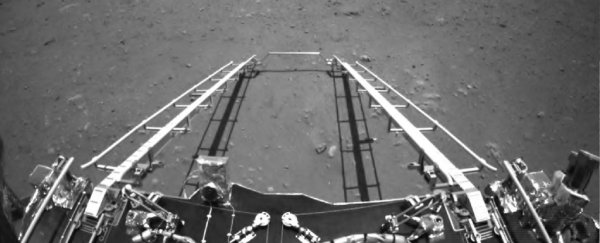Solar panels against an alien landscape, ramps and rods pointing at the Martian horizon – China's first probe on the Red Planet has beamed back its first "selfies" after its history-making landing last week.
The Zhurong rover was carried into the Martian atmosphere in a lander on Saturday, in the first ever successful probe landing by any country on its first Mars mission.
Zhurong, named after a mythical Chinese fire god, arrived a few months behind the United States' latest probe to Mars – Perseverance – and has been celebrated in China as a milestone in its ascent to space superpower status.
 View from navigation camera. (CNS/CNSA)
View from navigation camera. (CNS/CNSA)
The China National Space Administration on Wednesday published the images taken by cameras attached to the rover, which showed the obstacle-avoidance equipment and solar panels on the vehicle, as well as the texture of the Martian surface.
We have a Hi-Res visual! This is #Zhurong (#Tianwen1) Mars Rover reporting to Earthlings! I’m currently at 109.9E, 25.1N, Utopia Planitia, Mars. All look good! Preparing for the final deployment and scientific missions. Water/Ice under Mars 100m-deep surface? About to find out! pic.twitter.com/xkh39C2y3n
— Chinese Zhurong Mars Rover (@MarsZhurong) May 19, 2021
"People of the internet, the Mars images you've been longing for are here," the space agency said in a social media post containing the images.
The rover's landing was a nail-biter for Chinese space engineers, with state media describing the process of using a parachute to slow descent and buffer legs as "the most challenging part of the mission".
Quick GIF of separation of rover-lander stack from orbiter (1/2) pic.twitter.com/doQvu8u8dx
— Chinese Zhurong Mars Rover (@MarsZhurong) May 19, 2021
It is expected to spend around three months there taking photos and harvesting geographical data.
China has come a long way in its race to catch up with the United States and Russia, whose astronauts and cosmonauts have decades of experience in space exploration.
It successfully launched the first module of its new space station last month with hopes of having it crewed by 2022 and eventually sending humans to the Moon.
